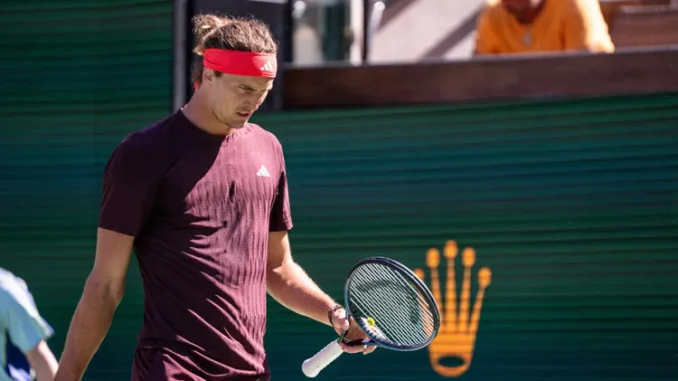
In the cauldron of Rome’s Foro Italico, where the clay courts test both skill and temperament, Alexander Zverev’s 2025 Italian Open campaign ended in a blaze of frustration. The No. 3 seed, a former champion in 2017 and 2024, fell to home favorite Lorenzo Musetti in a gripping quarter-final, 7-6(1), 6-4. But it was Zverev’s expletive-laden tirade against the chair umpire, captured on video and sparked by his discontent with the tournament’s tennis balls, that stole the spotlight. The German’s outburst, where he declared it “impossible to play tennis with this s***,” underscored a match fraught with tension and revealed the mounting pressures facing one of the sport’s top stars.
The quarter-final clash was a high-stakes battle from the outset. Zverev, coming off a strong clay season with a Monte Carlo semi-final and a Madrid quarter-final, held four set points in the first set but couldn’t convert, as Musetti’s crafty play forced a tiebreak. The Italian, buoyed by a passionate home crowd, dominated the breaker 7-1, leaving Zverev visibly rattled. At 2-1 in the second set, with Musetti leading, Zverev’s frustration boiled over. Handing a ball to a tournament official, he launched into a tirade, criticizing the balls’ slow pace and size. “Look at it. It’s impossible to play tennis with this s***. If this is entertaining tennis, I don’t know what the f*** we’re doing,” he fumed, also taking aim at Musetti’s deep return position, blaming it on the “f***ing kids’ balls.” Despite the umpire’s warning to watch his language, Zverev persisted, saying, “I don’t care, give me a warning. You cannot hit a winner off the ground with these balls.”
In his post-match press conference, Zverev elaborated on his grievances, noting that the issue was a recurring topic among players. “Balls were a joke today,” he said, explaining that the balls in Rome felt “very, very big” compared to those used in Monte Carlo, Madrid, and Munich. “The ball is totally different. It’s very difficult to hit winners here. It’s just how it is these days,” he added, highlighting how the slower balls hindered his aggressive, serve-heavy style, which relies on free points. The German, who averaged 112 mph on his first serve, felt the conditions favored defensive players like Musetti, who stood “six feet behind the baseline” to return.
The loss cost Zverev his No. 2 ranking, with Carlos Alcaraz overtaking him as the second seed for the French Open, starting May 25. Musetti, ranked No. 17, advanced to face Alcaraz in the semi-finals, riding a wave of confidence after his upset. “Lorenzo played unbelievable tennis,” Zverev conceded, acknowledging the Italian’s tactical nous. The match, which lasted over two hours, showcased Musetti’s flair for drop shots and his ability to absorb Zverev’s power, particularly in the tiebreak, where he won six straight points.
Zverev’s outburst wasn’t his first brush with controversy. In 2022, he was ejected from the Mexican Open for smashing an umpire’s chair, an incident that drew a $40,000 fine and a suspended ban. “I’m tired of this s***,” he said in Rome, echoing a pattern of vocal frustration that has marked his career, including disputes over electronic line-calling in Madrid and heckling in Munich. While his passion fuels his drive—evident in his 2024 French Open final run—his temper has drawn scrutiny, with some fans on social media calling for stricter penalties, while others sympathized, citing the balls’ impact on play.
As Zverev prepares for Roland Garros, where he’s reached the semi-finals four years running, the Rome exit is a setback but also a chance to reset. “Players are talking about it all the time,” he said of the ball issue, urging for consistency across tournaments. The defeat, coupled with his fiery words, paints a picture of a player under pressure, battling not just opponents but the conditions of the game. For now, the tennis world watches to see if Zverev can channel his intensity into a deep run in Paris, or if his frustrations will continue to define his clay-court narrative.
Zverev goes off on the umpire pic.twitter.com/hB3lQmXvF3
— fakemcgregor (@fakemcgregor1) May 14, 2025
Leave a Reply